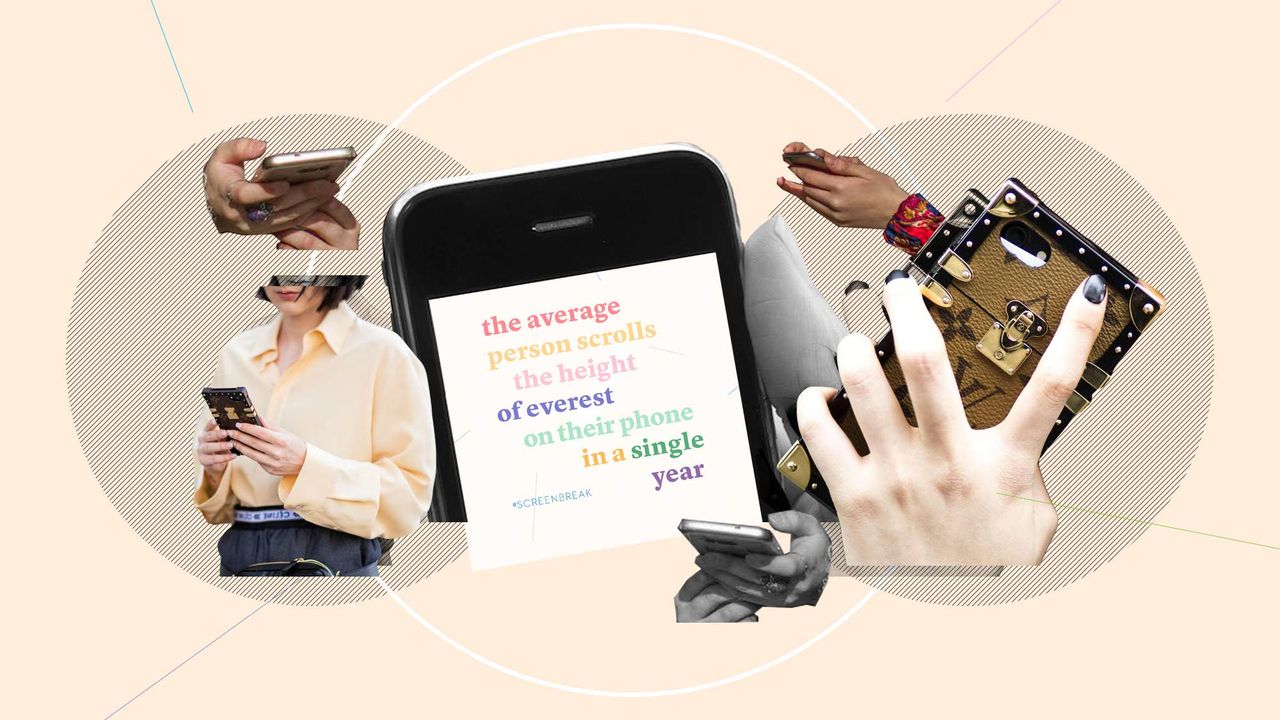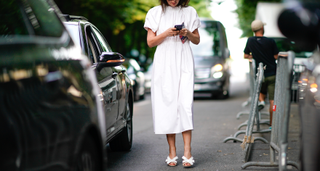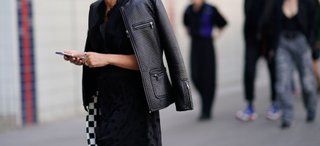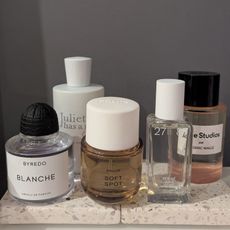How our phones became a 150-a-day habit, and why it's time for a #screenbreak
Do you keep your phone on the table when you're out with friends? Have you slipped away from a party to check your Instagram feed? Do you spin into a panic when there's no wifi? Today Marie Claire launches #screenbreak, a new campaign to help curb and control our addictive scrolling habits. Since, for most of us, a full digital detox isn't possible or practical, we've gathered expert advice, tricks and tech to help reduce the average 150-pickups-a-day routine, along with simple ways to be more mindful with the time you do spend on your phone. To kick off the campaign, Tanya Goodin, founder of digital detox movement Time To Log Off and author of Stop Staring at Screens, tells us why a major digital reset is long overdue.

Do you keep your phone on the table when you're out with friends? Have you slipped away from a party to check your Instagram feed? Do you spin into a panic when there's no wifi? Today Marie Claire launches #screenbreak, a new campaign to help curb and control our addictive scrolling habits. Since, for most of us, a full digital detox isn't possible or practical, we've gathered expert advice, tricks and tech to help reduce the average 150-pickups-a-day routine, along with simple ways to be more mindful with the time you do spend on your phone. To kick off the campaign, Tanya Goodin, founder of digital detox movement Time To Log Off and author of Stop Staring at Screens, tells us why a major digital reset is long overdue.
By Tanya Goodin
I don't need to tell you that you're spending too much time on screens - you know that. What started as a murmur of concern a year or so ago about our out-of-control screen habits is now a deafening roar. According to research we tap, click and scroll on our smartphones 2,617 times a day - picking them up 150 times on average - we now spend more time on screens than we do asleep!
Between scrolling aimlessly on social media when we're bored, getting sucked into yet another work email chain after hours and responding to the endless pings from all the WhatsApp groups we joined to make our lives more efficient - how are we getting anything done?

Our smartphones are seriously distracting us from the business of living our lives and even from being productive in our careers. One recent study showed that even if your phone is face down and switched off on your desk it reduces your IQ by 10 points. And how many of us can honestly say we ever now have our phones face down and switched off, or at least not ever for long?
But there's a more insidious side to our 24:7 screen habit and that's the impact it's having on our mental health, with research showing that it's women who suffer far more on this front.
Suzy Reading, author of The Self Care Revolution is not surprised and says she finds she often gets caught up in a 'feedback loop of anxiety' when she's on screens. 'When I'm anxious I check-in more as a means of distraction, which fuels my feeling of being over-stimulated and anxious. I can literally cycle between Instagram, Facebook and. Twitter on loop. Just the sight of my phone triggers an urge to check-in and a cascading of stress hormones.'
Marie Claire Newsletter
Celebrity news, beauty, fashion advice, and fascinating features, delivered straight to your inbox!
Tanya Burr: 'Without my phone, I can just breathe'
And all of those platforms that Suzy cycles through, and which most of us spend all our social media hours on, have the potential to heighten our anxiety: Twitter can be particularly hostile for women, breeding the type of nasty trolls that target us specifically online; Instagram has that carefully curated feed of perfect bodies living perfect lives; and Facebook doubles up the pressure on the 'emotional labour' we women do in marking birthdays, work anniversaries and celebrations. (It can't be just me who feels horribly guilty when I've missed one and forgotten to post on a friend's Facebook Wall).
Despite having spent over 20 years working exclusively online, my own Twitter trolling has thankfully been confined to a man tweeting to tell me I was 'attention seeking' after being on the BBC Radio 4 'Today' programme, but even that knocked me off-course for a bit. Rhiannon Lambert, leading Harley Street Nutritionist and author of Re-Nourish, has been less lucky. 'Only recently, I was the target of what appeared to be a cult in America following a restrictive diet. They got very personal, posting Photoshopped images of me with cruel comments with some even making aggressive threats.'
My personal challenge is Instagram and Katherine Ormerod, author of Why Social Media is Ruining Your Life, is with me on this 'I think any platform that enables easy cross-companion will always have the potential to inspire worry, centred on financial and romantic success, body image and life milestones in particular'.
This summer the endless streams of photos from friends' breezy seaside jaunts took their toll when I was grafting away in stifling London with little prospect of getting a break.
After realising I was starting to feel down every time I logged-in, I banned myself for a week. Suzy Reading sympathises: 'If I'm at home with the kids, seeing luxury travel snaps from other people definitely brings out the green-eyed monster. It also shows up in home envy, career envy, fitness envy, relationship envy... and this sense that I'm somehow not enough as an individual, not achieving enough or doing enough.'
5 apps to help control your screen time
'I love social media,' says Emma Gannon, host of the CTRL ALT DELETE podcast and author of The Multi-Hyphen Method, 'but I find being on it for too long makes me feel anxious after a while. For me it can be an easy way of procrastinating, so if I'm putting off on tidying up, or replying to my emails, or going to the gym then it can leave me feeling icky. Seeing what other people are constantly doing makes me feel anxious too. You should never feel like you're living other people's lives more than your own.'
'What I learned in my six months off social media'
When we're not wasting hours scrolling through our potentially toxic social feeds, there are other aspects of the digital world that have the ability to really pile on the pressure.
I agree with Shahroo Izadi, behavioural change specialist and author of The Kindness Method, on the unique tyranny of those little ticks: 'I find that the concept of read receipt can be quite anxiety-inducing. For those of us who struggle with overthinking and anxious thinking patterns, knowing someone has seen a message but not responded can cause a lot of us to tell ourselves stories that aren’t true - but are able to impact our day-to-day wellbeing nonetheless'.

But with most of us now spending our working days entirely on screens, how can we navigate the minefield of anxiety that so much of the digital world can cause us without being a hermit, giving up our jobs and reverting to a completely analogue way of life?
'I was picking up my phone every ten minutes' Marie Claire's editor-in-chief Trish Halpin on breaking her own screen cycle
Taking weeks at a time off screens isn't practical for most of us, but small, mindful, screen breaks throughout the day are. It's exactly the approach I've been employing myself in the four years since I refocused my digital career to specialise in digital health and wellbeing.
I've put together plenty of practical tips and techniques you can employ to live a more screen-balanced life in my new book Stop Staring at Screens and I've also surveyed some of my digital influencer friends to collate expert advice from them.
These are women who have to juggle working and promoting their careers in the digital world with carefully protecting their mental health and wellbeing. Here are their words of wisdom:
How 6 digital pros keep a balance
1) Set a morning routine
Shahroo Izadi: 'Deciding not to look at your phone for the first 20 minutes of the day can make a big difference to your day-to day-wellbeing. Whether it’s checking emails, reading the news or scrolling through Instagram, what we decide to expose ourselves to as soon as we open our eyes can put us on a back foot mentally and emotionally for the rest of the day.'
2) Turn off unnecessary notifications
From me, Tanya Goodin: 'Be ruthless with notifications. You don't need to know in real-time if an Insta post has been liked. It's those endless notifications that make you keep picking up your phone. Go through each app and cut down on those you receive. I have none at all enabled on my phone so I check it when I choose - not when it buzzes.'
3) Treat social media like a house party
Suzy Reading: 'Be mercenary about who you let in. I like Lucy Sheridan's suggestion to treat social media like a house party. If they wouldn't make your guest list, don't invite them to your social media feed'.
4) Dip into your self-esteem bank
Katherine Ormerod: 'I keep a list on Notes on my phone of the positive things I've achieved, or the attributes that I like about myself and if anything on social media starts to make me spiral, I go back to read them. It's like an emergency self-esteem bank!'
5) Execute a no phones at the table rule
Rhiannon Lambert: 'I've realised a healthy thing is not to use your phone in places where you relax. That’s the bedroom but also the dining table too. Remember, eating mindfully is always a good thing!'
6) Make use of the mute
Emma Gannon: 'I reflect on who I am following about once a month - I am not afraid to mute or unfollow accounts that no longer serve me or add to my life anymore. As my friend Abigail once said, "we care about what food we put into our bodies, so we should also care what online content we put into our minds."'
7) Introduce regular check-ins
Suzy Reading: 'Check-in and ask yourself, how do you feel afterwards? Listen to your body as well as tune in with your thoughts and feelings - is tension, discomfort or negativity showing up during or after social media usage? Ask yourself, is this life-giving behaviour or do you want to make some mindful changes?'
Don’t beat yourself up if any of these tips are hard initially to put into practice, the digital world has been engineered to be addictive and hard to step away from. Shahroo Izadi says many of her clients struggle with not looking at their phone for the first 20 minutes of the day and build up from 5 minutes.
Begin with baby steps and keep checking in with yourself about how you feel. Even those of us who are hyper-alert to all the dangers of the digital world struggle at times with keeping ourselves digitally healthy.
Katherine Ormerod concurs 'Even now, after having written a whole book about it and really, seriously working on my attitude to social media, I’m not impervious. Especially on a sad Friday night double screening in front of Netflix!'
Good luck!
Exactly how much time do 5 Marie Claire team members spend on their phones every day?

Screentime stats*
192
The number of times one in five women check their phone a day
44
The percentage of women who have to regularly remind themselves social media isn't real life
1 in 2
Women who say their phone gets in the way of things they have to do
41
The percentage of women who worry they're addicted to their phone
41
The percentage of women who worry they are addicted to their phone
*According to a Marie Claire survey published in the Daily Mail
The leading destination for fashion, beauty, shopping and finger-on-the-pulse views on the latest issues. Marie Claire's travel content helps you delight in discovering new destinations around the globe, offering a unique – and sometimes unchartered – travel experience. From new hotel openings to the destinations tipped to take over our travel calendars, this iconic name has it covered.
-
 10 extraordinary mothers around the world
10 extraordinary mothers around the worldWe celebrate the life-changing work of women who are changing the world for the better
By Mischa Anouk Smith
-
 I tried TikTok's lemon balm tea for a week to see if it can really help to reset your nervous system - my honest review
I tried TikTok's lemon balm tea for a week to see if it can really help to reset your nervous system - my honest reviewSit back and pour yourself a cup of calm.
By Anna Bartter
-
 Trust me, these 9 clean girl perfumes are the answer to smelling effortlessly chic
Trust me, these 9 clean girl perfumes are the answer to smelling effortlessly chicFreshness bottled
By Jazzria Harris